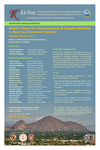ABSTRACT
Kinetic theory describes the stochastic interaction of many particles or agents via high dimensional evolution equations of probability densities. Computationally tractable, low dimensional equations for macroscopic observables (emergence) are obtained via asymptotics for large time scales and many agents. This follows the recipe of Boltzmann's kinetic gas theory, leading to the basic equations of gas dynamics in the limit.
In the social science context, this methodology has been extended from simple
gas molecules to birds and fish to describe flocking, and to opinions to describe the evolution of rumors in a crowd. The main advantage of this theory is that in its core it is an accurate, analytic and explicit first principle theory and, when it works, it allows for an analytic description of Agent Based Simulations (ABS). It may also be used to relate popular aggregate models like population models in the social sciences or diffusion models in economy to their microscopic origins.
Applying such methods in biology is well within the experience of most applied mathematicians - they typically know physics and therefore have an idea what the interesting questions for a fish swarm are. This is less the case for simulation models in social science and economics. As a result, mathematical applications in social sciences are often not very relevant and seem to be staying at a descriptive qualitatitve level. In essence the theory for emergent social phenomena is just emerging and the relationship between model, their purpose and data is unresolved.
GOALS
This workshop will bring together applied mathematicians, social scientists and engineers to educate each other about:
-
The most interesting and promising fields in social sciences and economics, their research questions and the possibilities and obstacles for a kinetic description.
-
The possibilities of an aggregate mathematical description of multi-agent simulations, its successes and its limitations.
-
The use of kinetic models in these disciplines - qualitative and quantitative models, their validation and their predictive power.
REGISTRATION CLOSEDORGANIZERS
|
CONFIRMED PARTICIPANTS
FUNDINGA limited amount of travel and local lodging is available for researchers in the early stages of their career who want to attend the full program, especially for graduate students and post-doctoral fellows. INFORMATION FOR PARTICIPANTSVisitor Guide Center for Social Dynamics and Complexity
Main Office-Room 412
Interdisciplinary Science and Technology Building 1
Arizona State University
Tempe, AZEmail: armbruster@asu.edu, leah@ices.utexas.edu CONFERENCE POSTER 
ACKNOWLEDGMENT Funding provided by the NSF through the KI-net Grant. |

